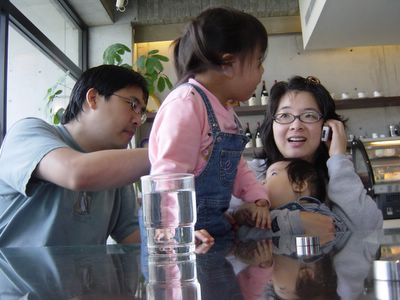Kaohsiung, Taiwan
I'm still getting over jetlag, I think. I'm sleeping normal local hours, but I hit walls during the day when my energy just plunges. And going to sleep around 10:00 P.M. is after about two hours of herculean effort to stay awake. And I'm starting to worry about my coffee addiction.
What I mentioned about the purpose of my wearing Deer Park monastic clothing over here is valid to me, but it does have twists in this culturally Chinese society. One of my cousin's friends asked about what I was wearing, and as soon as my cousin told her I was a monastic aspirant, she understood. Understanding the monastic part, she then asked if I had some sort of problem I was trying to get away from! Mainstream Chinese culture is very practical and worldly, so the immediate thought about someone entering a monastery is that they are trying to get away from something. My cousin had to reassure her that some people sincerely want to enter monasteries to develop themselves internally. I think that's along the lines of what my cousin told her.
I think Zen is a bit player in the mainstream Chinese
cultural understanding of Buddhism, which makes sense since mainstream Chinese culture is very practical, and even spiritual understanding is tied into material benefits. Perhaps to most Chinese, Zen is just about sitting (and when you're sitting, you're meditating, and when you're not sitting, you're not meditating), and the nitty-gritty philosophical aspects of it are just kinda way out there. So it’s better to stick to the tangible aspects of what sitting’s about using metaphors for what sitting trains our minds to do.
My stock description for sitting is imagining a stream or a brook, and thoughts are like leaves floating by on the surface. We tend to pick up the leaves and think about them concretely, analyzing them, developing feelings regarding them. Maybe an incident with someone, maybe something you did or said that you’re reinforcing or regretting, maybe something you read about or saw. Maybe you feel bad, angry, nervous, or anxious because of the thought. While sitting, we try not to pick the leaves out of the water, but sometimes it just happens in the course of brain activity, the flowing stream. It happens, it’s normal, but while sitting, once we realize we’ve picked a leaf out of the water, we recognize it and put it back in and let it go and flow away. It’s a skill to develop, and maybe the next few leaves flow by without incident, but eventually another one comes by that gets our brain’s attention and we pick it up until we realize we’ve picked it up, and then we consciously recognize it and let it go. Over and over it happens, and that’s OK, that’s part of the process to eventually get the mind to a point where it’s in different states. You don’t do anything to get to those states, it happens naturally sooner or later, and you only recognize it once you’ve come out of it. What it means to an individual is subjective, though. Some people might be ‘so what?’ about it while others find it relaxing. Some people find it revelatory. I just think it’s neat.
It’s good to come up with new metaphors to keep things fresh, and they’re pretty easy to find in the things you do. These descriptions are to distinguish a proper meditative state of mind to be in from our ordinary linear, analytical thinking minds. Another one is a bike coasting along, and that’s sitting. When a thought comes along and I attach to it and think about it, that’s hitting a hill and having to pedal and crank and put effort into it. The visualization is to put the bike into a downhill coast again to stop the active thinking. The cranks and the chain should not be moving as thoughts come and go.
A more specialized metaphor is of electric basses with active or passive pickups. Electric guitars and basses don’t need electricity to work. Pickups are just magnets that read the string vibrations and send them via wires to an amplifier, which does need electricity to transform the vibrations into sound waves. But more and more common in the electric bass market are active electronics which require an onboard battery to power the pickups and/or a preamp. The benefit is boosting the bass signal at its source so that it cuts through mixes more easily, and is arguably more controllable. Thinking linear, concrete thoughts is like active pickups, and you want to turn the electronics off so that the signal is passive, no boost. The string vibrates in the electromagnetic field and sends one frequency through to the amp, play another note and another frequency is played.

